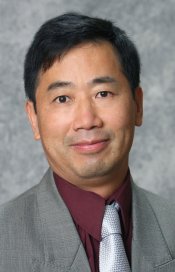South Dakota State University’s remote sensing program has been ranked as one of the top academic programs in the world by the Shanghai Ranking’s 2022 Global Ranking of Academic Subjects.

SDSU’s program, housed in the Geospatial Sciences Center of Excellence, Department of Geography and Geospatial Sciences, came in at 22nd in the world and the fifth-best program in the United States. It trails only the University of Maryland, College Park; California Institute of Technology, Boston University and Mississippi State University.
“Our scientists, including postdoc and Ph.D. students, at the GSCE use various satellite observations with a spatial footprint from three meters to 500 meters and a temporal revisit time from five minutes to 16 days to monitor variation of the earth surface,” said Xiaoyang Zhang, co-director and senior scientist of the GSCE.
“Our research activities including calculating biomass-burning emissions every hour to support the National Oceanic and Atmospheric Administration’s mission in regional and global air quality forecast, and generating NASA global vegetation phenology product in support of scientific research on climate change and the environmental impact of human activity,” Zhang added. “We also monitor crop growth condition and disease impact in real time, which is critical to crop management for farmers and government agencies and decision-making for many agricultural finance and insurance companies.”
The GSCE conducts a variety of basic and applied research into the use of remote sensing to monitor, map and model the dynamics of the vegetated land surface at a variety of spatial and temporal scales. With funding support from NASA, NOAA, the U.S. Department of Agriculture, United States Geological Survey, and Intelligence Advanced Research Projects Activity, the GSCE addresses fundamental questions about functioning of the biosphere and its implications for the environment and human welfare in a rapidly-changing world.

Currently, the geospatial science and engineering graduate program at SDSU offers a remote sensing specialization option. This interdisciplinary, Ph.D.-level program combines advanced coursework with cutting-edge research to advance the field of geospatial sciences. It focuses on transforming geospatial data into relevant information through acquisition, processing, characterization, analysis and modeling in order to understand geographic patterns, processes and relationships at scales ranging from landscapes to the globe.
“We expect our center can get more support in future, expend our research capability, and improve our rank to be one of the best centers in the world,” Zhang added.
“The GSCE continues to produce impactful research that benefits our state, nation and world,” said Bob Watrel, an associate professor and head of the Department of Geography and Geospatial Sciences.
Shanghai Ranking has published world university ranking by academic subjects since 2009. Using an improved methodology, the Global Ranking of Academic Subjects was first published in 2017.
This year’s edition contains rankings of universities in 54 subjects across natural sciences, engineering, life sciences, medical sciences and social sciences. The ranking methodology uses a variety of indicators, including research output, international collaboration, research quality and influence, and international academic awards.
- Contact:
- Telephone number: 605-688-6161
Republishing
You may republish SDSU News Center articles for free, online or in print. Questions? Contact us at sdsu.news@sdstate.edu or 605-688-6161.

